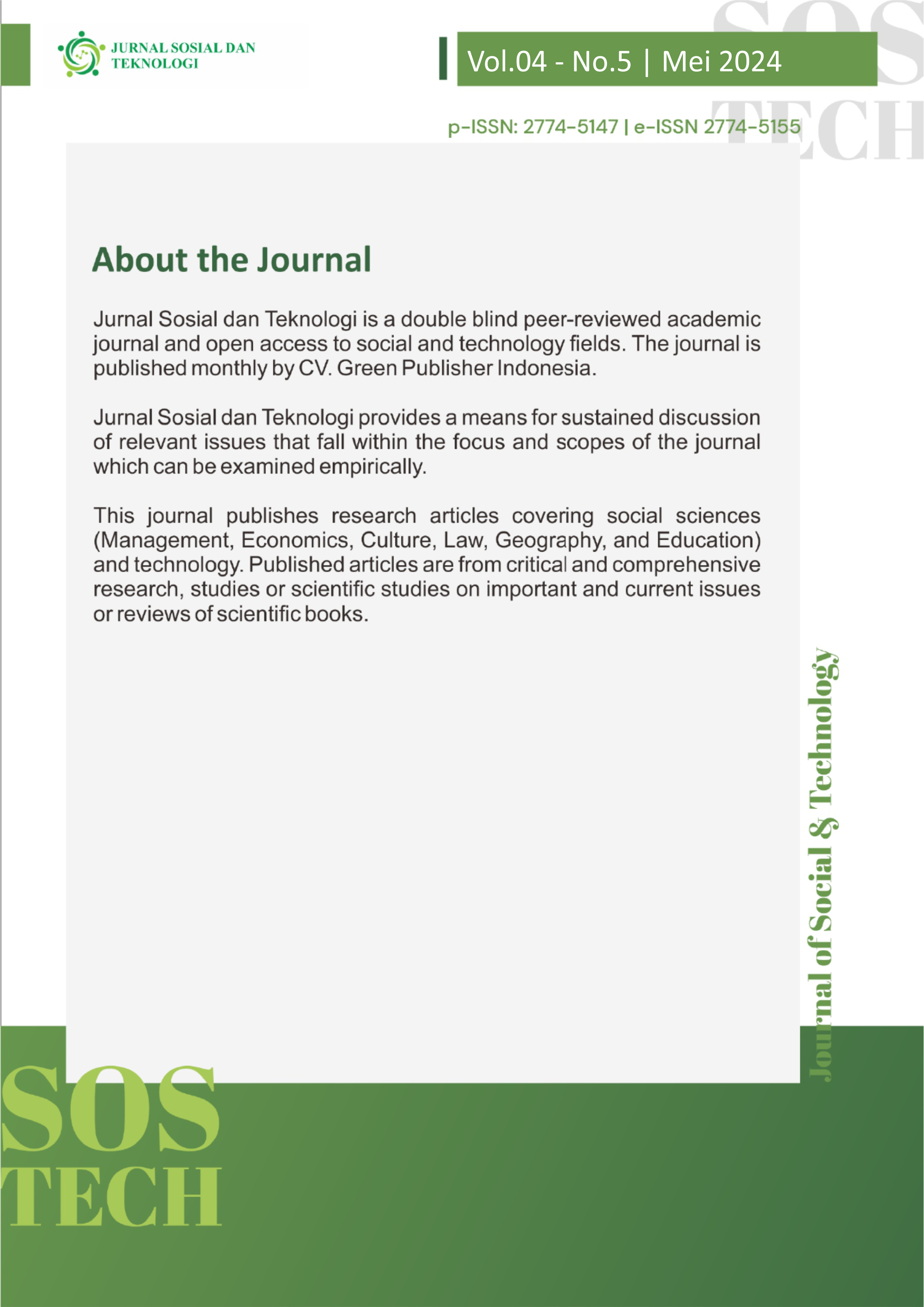Water Infiltration Policy for Urban Flood Management
DOI:
https://doi.org/10.59188/jurnalsostech.v4i5.1220Keywords:
Flood, Water Catchment, PolicyAbstract
This research was conducted to determine the implementation of water absorption policies for flood management in urban areas, especially in the city of Cirebon at the Cirebon City Public Works and Spatial Planning (DPUPR) department. The research approach used is normative juridical, conceptualizing law as written norms so that this research emphasizes studies in the form of legislative products, namely those that regulate water absorption such as regional regulation number 38 of 2019 concerning the implementation of groundwater conservation through infiltration wells and infiltration holes. biopore. Policy implementation in flood management by the Cirebon City PUPR Service has included handling floods and puddles as a priority in the Regional Government Work Plan (RKPD) for 2025. For handling urban drainage, the PUPR Service's work target is to reach up to 83% by 2024, and 86% for 2025, and 89% for 2026. One of the strategies taken includes the creation of retention ponds, absorption wells and eco-drainage. However, there are still several obstacles in implementing this policy, such as limited resources and lack of community participation. To overcome these obstacles, efforts need to be made such as increasing the budget, providing adequate human resources, and educating the public about the importance of water absorption. Overall, the implementation of the water absorption policy for flood management in Cirebon City has shown a positive direction. With continued efforts and collaboration from various parties, it is hoped that this policy can be more effective in minimizing the risk of flooding in urban areas.
References
Alshammari, Eissa, Azimah Abdul Rahman, Ruslan Rainis, Nurhafizul Abu Seri, and Noor Fazeera Ahmad Fuzi. 2023. “The Impacts of Land Use Changes in Urban Hydrology, Runoff and Flooding: A Review.” Current Urban Studies 11(1):120–41.
Anon. 2024. “Understanding Natural Disasters.” Wikipedia. Retrieved (https://id.wikipedia.org/wiki/Bencana_alam).
Astuti, Endang Puji, Pandji Wibawa Dhewantara, Heni Prasetyowati, Mara Ipa, Cucu Herawati, and Kadina Hendrayana. 2019. “Paediatric Dengue Infection in Cirebon, Indonesia: A Temporal and Spatial Analysis of Notified Dengue Incidence to Inform Surveillance.” Parasites & Vectors 12:1–12.
Berghuis, Harold W. K., A. Veldkamp, Shinatria Adhityatama, Sander L. Hilgen, Indra Sutisna, Didit Hadi Barianto, Eduard A. L. Pop, Tony Reimann, Dida Yurnaldi, and Dian Rahayu Ekowati. 2021. “Hominin Homelands of East Java: Revised Stratigraphy and Landscape Reconstructions for Plio-Pleistocene Trinil.” Quaternary Science Reviews 260:106912.
Gandharum, Laju, Djoko Mulyo Hartono, Asep Karsidi, and Mubariq Ahmad. 2022. “Monitoring Urban Expansion and Loss of Agriculture on the North Coast of West Java Province, Indonesia, Using Google Earth Engine and Intensity Analysis.” The Scientific World Journal 2022.
Handayani, Wiwandari, Uchendu Eugene Chigbu, Iwan Rudiarto, and Intan Hapsari Surya Putri. 2020. “Urbanization and Increasing Flood Risk in the Northern Coast of Central Java—Indonesia: An Assessment towards Better Land Use Policy and Flood Management.” Land 9(10):343.
Harahap, Syawaludin A., Noir P. Purba, and Mega L. Syamsuddin. 2019. “Trend of Coastline Change for Twenty Years (1994-2014) in Cirebon, Indonesia.” World Scientific News 138(2):79–92.
Latianingsih, Nining, Iis Mariam, Christina L. Rudatin, Petrus Usmanij, and Vanessa Ratten. 2022. “Aligning Strategic MSME Entrepreneurship to Local Government Policy: A Case Study of a Tourism Village in Bogor Indonesia.” Pp. 21–33 in Strategic Innovation: Research Perspectives on Entrepreneurship and Resilience. Springer.
Li, Lei, Alexandra M. Collins, Ali Cheshmehzangi, and Faith Ka Shun Chan. 2020. “Identifying Enablers and Barriers to the Implementation of the Green Infrastructure for Urban Flood Management: A Comparative Analysis of the UK and China.” Urban Forestry & Urban Greening 54:126770.
Lianbing, Deng, Li Daming, and Cai Zhiming. 2020. “Emergency Management System of Urban Waterlogging Based on Cloud Computing Platform and 3D Visualization.” Journal of Intelligent & Fuzzy Systems 39(4):5595–5608.
Nguyen, Thu Thuy, Huu Hao Ngo, Wenshan Guo, Xiaochang C. Wang, Nanqi Ren, Guibai Li, Jie Ding, and Heng Liang. 2019. “Implementation of a Specific Urban Water Management-Sponge City.” Science of the Total Environment 652:147–62.
Putri, Rahma Wardana, Junaidi Junaidi, and Candra Mustika. 2019. “Pengaruh Pertumbuhan Ekonomi, Indeks Pembangunan Manusia Dan Kepadatan Penduduk Terhadap Tingkat Kemiskinan Kabupaten/Kota Di Provinsi Jambi.” E-Jurnal Ekonomi Sumberdaya Dan Lingkungan 8(2):96–107.
Sari, Mega Indah Puspita, and Mohammad Abdul Khafid. 2021. “Knowledge and Attitude of Junior High School Students towards Hydrometeorological Disaster Preparedness: A Case Study in Cirebon City, Province of West Java.” Pp. 817–23 in 6th International Seminar on Science Education (ISSE 2020). Atlantis Press.
Solihuddin, T., S. Husrin, H. L. Salim, T. L. Kepel, E. Mustikasari, A. Heriati, R. N. A. Ati, D. Purbani, L. O. N. Mbay, and V. Y. Indriasari. 2021. “Coastal Erosion on the North Coast of Java: Adaptation Strategies and Coastal Management.” P. 12035 in IOP Conference Series: Earth and Environmental Science. Vol. 777. IOP Publishing.
Xiong, Lijun, Shiqiang Lu, and Juan Tan. 2023. “Optimized Strategies of Green and Grey Infrastructures for Integrated Control Objectives of Runoff, Waterlogging and WWDP in Old Storm Drainages.” Science of The Total Environment 901:165847.

Published
How to Cite
Issue
Section
License
Copyright (c) 2024 Jurnal Sosial Teknologi

This work is licensed under a Creative Commons Attribution-ShareAlike 4.0 International License.
Authors who publish with this journal agree to the following terms:
- Authors retain copyright and grant the journal right of first publication with the work simultaneously licensed under a Creative Commons Attribution-ShareAlike 4.0 International (CC-BY-SA). that allows others to share the work with an acknowledgement of the work's authorship and initial publication in this journal.
- Authors are able to enter into separate, additional contractual arrangements for the non-exclusive distribution of the journal's published version of the work (e.g., post it to an institutional repository or publish it in a book), with an acknowledgement of its initial publication in this journal.
- Authors are permitted and encouraged to post their work online (e.g., in institutional repositories or on their website) prior to and during the submission process, as it can lead to productive exchanges, as well as earlier and greater citation of published work.






